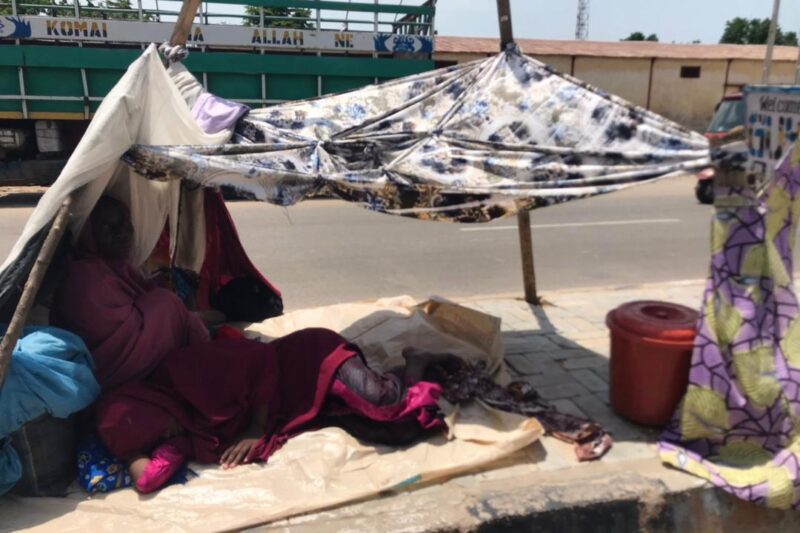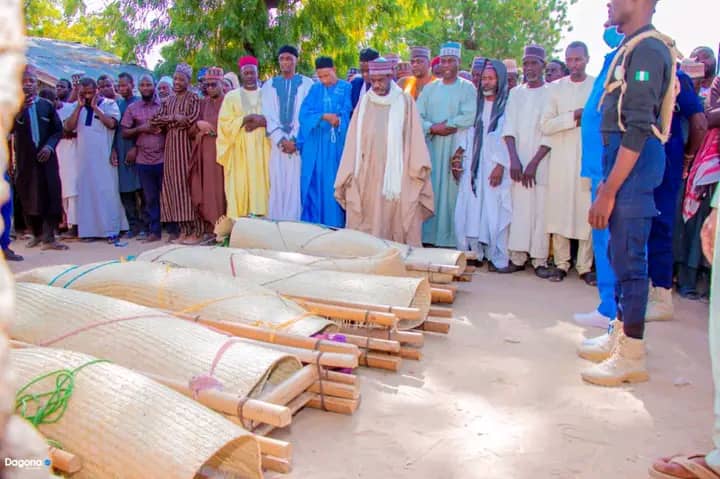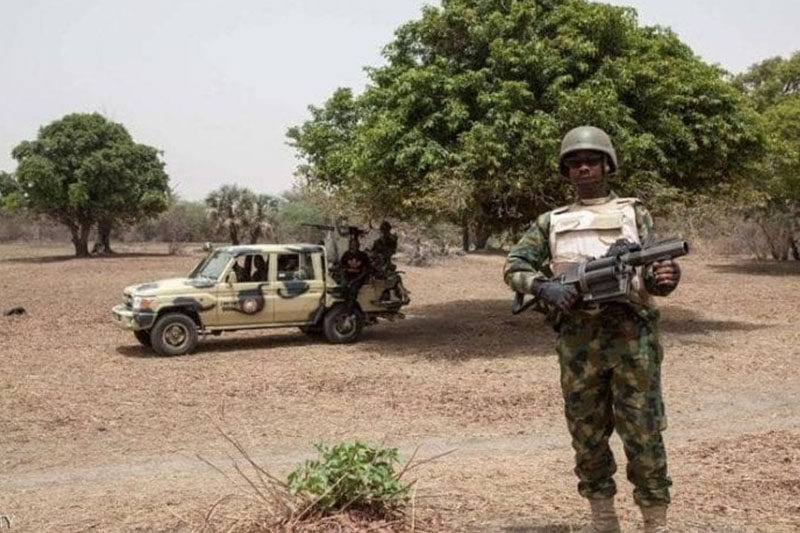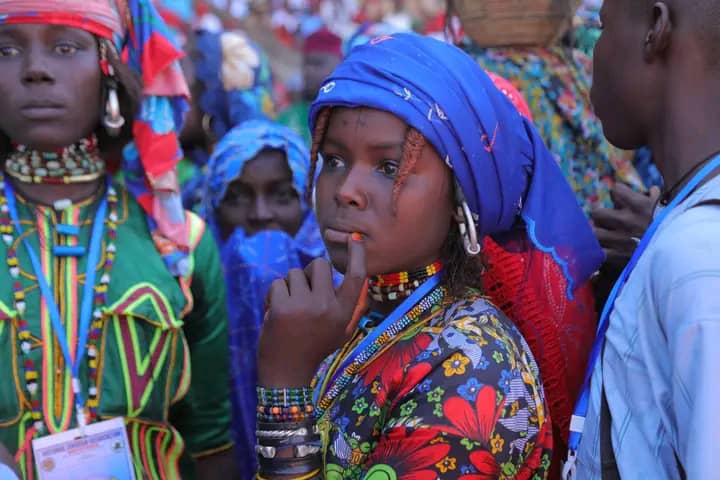Hundreds of protesters block major road demanding that the Borno State government address their plight by providing food and clean water, as well as other relief essentials.
Hundreds of homeless flood victims have taken to the streets of Maiduguri for the second time in a week to protest against the Borno State government’s “neglect” in providing relief assistance and humanitarian aid.
Hundreds of people have erected makeshift tents on roadsides and at fuel stations. They say they have no food, no clean drinking water and no place to go because their homes were submerged and destroyed in the devastating flood that engulfed more than half of the city and its environs in the early hours of Tuesday, September 10.
The flood occurred when the Alau Dam – 16km from Maiduguri, the capital of Borno State – began overflowing.
At least two million people were affected and more than 400,000 displaced. Many people are still missing. The death toll has not been released.
The flood destroyed critical infrastructure, leaving hundreds of thousands without access to basic necessities.
On Tuesday, September 25, hundreds of protesters blocked a major road at the Abbaganaram-Galadima junction demanding that the state government address their plight by providing food and clean drinking water, as well as other relief essentials.
Mamma Gana Abubakar told RNI that she joined the protest because of “severe hunger”.
“I have five children and my husband is very sick. Flood water submerged and destroyed most of the houses in Kwana-Bakwai in the Kofa-Biyu area. We have been staying in the Galadima-Abbaganaram area at the Mala Sheriff Filling Station. We do not have proper shelter, food or clean water.
“It is extremely difficult living on the street. My husband is sick – I think he has contracted malaria. There are so many mosquitoes around and we do not have a net. He is getting worse by the day and he can’t go to hospital because we cannot afford it.
“We hate living on the streets. We would go home if we could but our house was destroyed in the flood. The remains are still under water.
“Our own government is neglecting us. We are protesting because we believe the government has let us down. The government needs to know how much its citizens are suffering. We are not satisfied with the way the government is handling the issues affecting homeless flood victims.”
Fatima Idris said she had seven children to care for “and it is extremely difficult on the streets”.
“Our house was submerged in the flood. We escaped the floodwater but we had nowhere to go. So now we are staying on the streets.
“We decided to stage a peaceful protest by blocking the major road at the Abbaganaram-Galadima junction yesterday [Tuesday] morning to express our grievances over the way the government is treating flood victims.
“The government pledged to take care of us but here we are without any shelters, food, clean water, toilet facilities and other basic social amenities. The situation is dire.
“We have to beg to get money for food to feed our children. It’s risky for women to be on the streets for weeks. We are exposed to all kinds of dangers, including sexual exploitation. It’s frightening.
“We do not feel safe here with our kids. Our children are failing sick because they are being bitten by mosquitoes. We cannot afford to buy a mosquito net to protect ourselves from contracting malaria.
“Most of us did not want to protest. It was our last resort. The hardships we are experiencing and the extremely poor living conditions forced us to take to the streets to express our anger and send a strong message to the government about the plight of homeless flood victims who are stranded without shelter, food and water.”
Aisha Zanna said: “We are protesting to try to improve our own wellbeing. We are begging the government to act quickly and respond. We escaped the flood with only the clothes we are wearing. I am tired of being on the street in my own hometown.
“As a woman I feel extremely disappointed and I want to go back home, but sadly, I have no place to call home because the floodwater destroyed my house.”
Barkindo Mohammed Sa’idu, the general manager of the Borno State Emergency Management Agency (SEMA), told RNI that the state government had been informed about the protest.
“Police were deployed to maintain law and order.
“We were told about the protest and we informed the state governor, Babagana Umara Zulum. He has pledged to visit the protesters so that their challenges will be addressed.
“The state government is overwhelmed. There are thousands of displaced persons staying in makeshift camps and thousands more on the streets.
“It is difficult for the government to assess and manage unregistered flood victims living on the streets. They are scattered around the city, staying on roadsides and at filling stations. It is difficult managing the flood victims who are registered, let alone those who are not. It is impossible to attend to the plight of all flood victims at this extremely critical time.
“The homeless must lay complaints at the SEMA office instead of protesting. We will do our best to provide flood victims with emergency relief packages, including food and essential non-food items. But it is impossible to deal with all these homeless people if we do not have their data at hand.
“We have put in place measures to get all their information so that we can provide the necessary humanitarian assistance.”
On Friday, September 20, hundreds of flood victims staged a peaceful protest at the Baga Road area of Maiduguri.
The protesters obstructed traffic at the junction, expressing frustration over what they said was neglect by the government. They complained that they were starving and said they had not been given any relief assistance.
Police were deployed to maintain peace.
The commissioner of police, Mohammed Lawal Yusufu, in a statement released by police spokesperson Nahum Kenneth Daso, urged victims in Maiduguri to remain calm.
He called on displaced citizens to be patient and cautioned against blocking major roads, saying that would only exacerbate the situation, potentially undermining peace in the state and hindering relief efforts.
“The Borno State government, in partnership with the National Emergency Management Agency [NEMA], State Emergency Management Agency [SEMA], and humanitarian organisations, has instituted essential relief measures for the benefit of flood victims.”
When contacted by RNI for comment on Tuesday’s protest, Daso said: “I will get back to you.”
RNI had not received a response at the time of publication of this report.
SHETTIMA LAWAN MONGUNO









